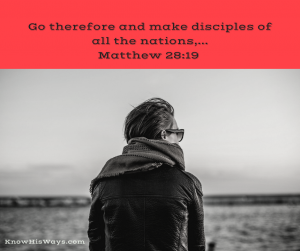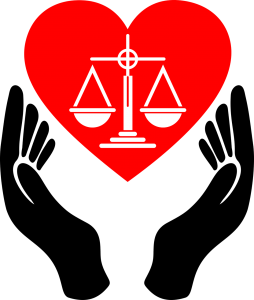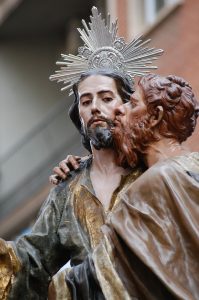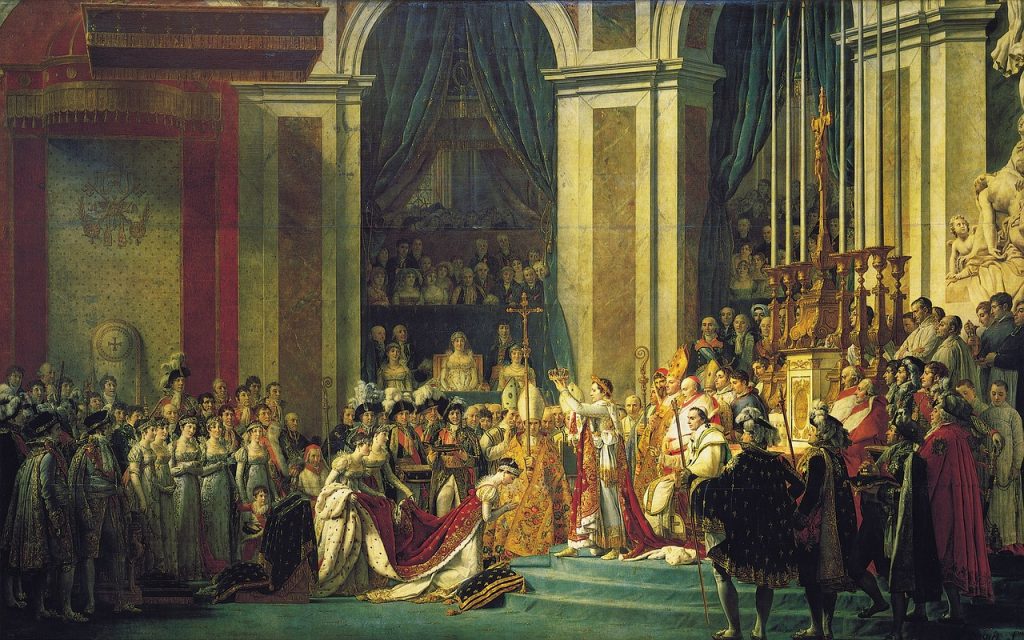Uncategorized
God’s Desire for Justice (Part III)
The Lord expects us to act justly and do what is right. How do we ensure we are standing in the gap for others rather than fighting for our own cause?
First of all, we should ask ourselves if the outcome of this situation would benefit us personally. If the outcome is of a greater benefit to us rather than others, then we are fighting for ourselves rather than standing in the gap for the injustice faced by others.
Secondly, does the injustice cause us to get offended to the point of anger and hatred towards others? Then we are either fighting for ourselves, or our soul is not purified enough to hear God clearly on the battle plan. The scripture clearly states:
for the wrath of man does not produce the righteousness of God. James 1:20
If we want to fight for justice, we need to allow God to purify our hearts otherwise, our battle stems from our self-righteousness rather than God’s righteousness.
Thirdly, we should determine if we are jealous of the perpetrator? Many times, injustice causes us to be jealous of others. We feel those individuals are getting away with their oppression. The scripture tells us:
Do not envy the oppressor, And choose none of his ways; Proverbs 3:31
If we envy the oppressor, our focus has shifted from God to man. When our focus changes, our ways will begin to change as well. The scripture commands us not to envy the oppressors. That means we have much work to do with God in order for Him to soften our hearts and even fill our hearts with love rather than envy and jealousy.
When we are fighting for ourselves, the injustice feels very personal and makes us almost jealous of what others have done. When we are fighting for others, our hearts are guarded, and we are not as emotional about it. We can speak and act with the sober mind and soft hearts, and we can allow things to play out according to God’s time-frame.
If we desire to do what is right, we need to get the mind and the heart of Christ. We study the scriptures to find what God says about every situation. We also need to examine our motives and the condition of our hearts. This allows us to represent the Lord in the injustice rather than ourselves.
Do you see the injustices around you? Do you have opportunities to stand for justice for others? Are you certain that you are fighting for others rather than yourself?
God’s Desire for Justice (Part II)
This is what the Lord says: “Maintain justice and do what is right, for my salvation is close at hand and my righteousness will soon be revealed. Blessed is the one who does this—the person who holds it fast, who keeps the Sabbath without desecrating it, and keeps their hands from doing any evil.” Isaiah 56:1-2
The Lord tells His people that His righteousness is revealed when His people preserve justice and do what is right. To find what is right in God’s eyes, we need to go to His word. The challenge in going to His word is not to take scriptures out of context. We need ensure that we apply them correctly in the light of other scriptures.
For example, God’s word tells us to help the poor and the needy (see Deuteronomy 15:11). There are also scriptures that tell us that debt is bondage (See Proverbs 22:7). Therefore, we are to have an open hand towards those who are in need, but do it with the money we have. It may look like a compassionate thing to do to help the needy unconditionally, but the scripture does not support borrowing to help the needy. Unfortunately, some people jeopardize their own finances by borrowing to help others. God tells us to do right with what we have.
Another example about doing right is a woman who desires to serve in her church, but her husband is not interested in getting involved. There are many scriptures about loving God and serving God, but some people equate this with serving in the church. The wife thinks that the husband should love serving in the church, and if he is not, then they are not equally yoked. This causes some women to choose service in the church over their marriage, and they begin to grow apart and develop serious marital issues.
The scripture tells us that we are to love God with all our hearts, minds, and strengths, but this can look very differently for every person and every couple. The primary work of service should happen in our spheres of influence and should not be narrowed down to church activities. In addition, God created marriage before there was ever a church. Our marriage is supposed to reflect our relationship with Christ. If we have to jeopardize our marriage in the name of service at church, is definitely a misunderstanding of the scriptures and God’s heart. Doing right requires a proper application of God’s word!
Do you have a balanced view of the scriptures? Do you have an understanding of God’s heart regarding acting justly and doing right?
God’s Desire for Justice (Part I)
The Lord cares very much about justice. The book of Isaiah tells us the following:
This is what the Lord says: “Maintain justice and do what is right, for my salvation is close at hand and my righteousness will soon be revealed. Blessed is the one who does this—the person who holds it fast, who keeps the Sabbath without desecrating it, and keeps their hands from doing any evil.” Isaiah 56:1-2
Definition of “maintain” (According to Strong’s Hebrew H104): to keep watch, have a charge over, to protect,…
Because of man’s fallen nature, justice is unstable, and it can be taken away either gradually or suddenly. Injustice is an abomination to the Lord, and there are serious consequences to being unjust according to scripture. God tells His people to be watchmen over justice and ensure that it is protected. In addition, God expects His people to act justly.
Injustice can occur in many different circumstances. Jesus saw the religious people lording it over the people, and they put heavy spiritual burdens on their shoulders. Injustice can be due to economic and social reasons when the voices of some is not heard or valued. Injustice can occur when children are neglected, mistreated, or abused. Injustice can have many faces.
In the above scripture, the Lord tells us to do what is right. The question is, “What is right”? Those things that are in agreement with God’s truth, are good and right. Anything that does not line up with the Biblical truth will eventually cause injustice. Laws that defy God’s principles but please man will produce injustice.
I will continue with this subject in the next devotional.
Faces of Courage (Part V)
Jesus was faced with opposition from every side. Judas betrayed him. Peter, one of his closet disciples, denied him, and now Jesus was falsely accused. Jesus had plenty of reasons to threaten those who misunderstood him. He could have chosen to argue with the people, or defend His position. He could have challenged the religious through the scriptures. However, Jesus did none of the above. Jesus’ response is described in below scripture:
As soon as the chief priests and their officials saw him, they shouted, “Crucify! Crucify!”But Pilate answered, “You take him and crucify him. As for me, I find no basis for a charge against him.”
The Jewish leaders insisted, “We have a law, and according to that law he must die, because he claimed to be the Son of God.”
When Pilate heard this, he was even more afraid, and he went back inside the palace. “Where do you come from?” he asked Jesus, but Jesus gave him no answer. “Do you refuse to speak to me?” Pilate said. “Don’t you realize I have power either to free you or to crucify you?”
Jesus answered, “You would have no power over me if it were not given to you from above. Therefore the one who handed me over to you is guilty of a greater sin.” John 19:6-11
Pilate asked Jesus a question, but Jesus did not answer him. Pilate reminded Jesus that he had the power to release Him or convict Him, but Jesus still did not defend Himself. He only reminded Pilate who was his true source of authority.
It takes courage not to defend ourselves. Generally, we defend ourselves for one of three reasons. The first reason is because we want to clear our name of any wrong doing and explain our position. This didn’t seem to be an issue for Jesus. He never seemed to be concerned about His reputation. Secondly, we speak up because we want to fight for our rights and correct an injustice committed against us. Jesus knew that it was man’s sinful nature that brings about injustice towards others, and He knew a deeper solution was needed for that condition. Thirdly, we find a need to defend God and take up His cause. Jesus always spoke about God as His father and showed them His special relationship to the Father. That was more important to Him than fighting for God as an advocate.
Jesus didn’t fall for any of these temptations. He was courageous in the midst of all the injustice, betrayal, and rejection. He knew God was the ultimate authority, so He looked to the Lord in the midst of all the pain.
Are you focused on those who wronged you? How you are handling your challenges? Are you facing them with courage?
Faces of Courage (Part IV)
Esther was a Jewish girl who was raised by her cousin Mordecai. King Ahasuerus married Esther, and she became the Queen of Persia. The scripture tells us that the King loved Esther more than all the other women in his harem. Esther had the king’s favor. However, she had to be courageous to risk her life and disclose her true identity.
When the king’s assistant, Haman, plotted to annihilate the Jewish people, Mordecai sent the news to Esther, and he also sent the following message to her:
And Mordecai told them to answer Esther: “Do not think in your heart that you will escape in the king’s palace any more than all the other Jews. For if you remain completely silent at this time, relief and deliverance will arise for the Jews from another place, but you and your father’s house will perish. Yet who knows whether you have come to the kingdom for such a time as this?” Esther 4:13-14
Photo source: https://goo.gl/images/5CEvMy
Esther may have been a bit fearful in approaching the king since he had not invited her to his chambers for thirty days. However, Mordecai’s message had a sobering impact on her. He reminded her of two important facts.
The first was that God desired to save His people, and that if she did not respond to the call, God would use someone else to carry out that assignment. This is an important principle. Just because God has chosen us to fulfill His purpose, it does not mean that He will indefinitely wait for our obedience. God desires for us to partner with Him in accomplishing His will. Nevertheless, if we don’t respond, He may eventually use someone else to get the job done.
The second fact was that Mordecai reminded Esther that her position as the queen may have been for such a time as this. God had favored Esther in order to use her influence at this particular time. This fact applies to us as well. God’s favor in our lives has a purpose. His blessings are supposed to bring life to us as well as others. He expects us to use our favor for the benefit of others.
She gained clarity of vision through Mordecai, and she realized that her favor had a purpose. Esther became determined to approach the king even if it meant losing her life. She was no longer comfortable to just be a queen. She became courageous and risked her life in order to fulfill God’s purpose. God’s vision gave her the courage to face the injustice and stand in the gap for her people.
I have used my favor at times to stand in the gap for others. I knew that God was pleased, but my flesh and my soul had to experience the pain of rejection. I also had to face the consequence for standing in truth. Being courageous does not guarantee results, but it does please the Lord.
Are you willing to be courageous and to stand in the gap for others? How are you using your favor to bless others?
Faces of Courage (Part III)
Jonathan was King Saul’s son, and, technically, he would have been next in line to the throne of his father. However, Saul disobeyed the Lord, and therefore, God rejected Saul as king (See 1Samuel 15:10-35). This also meant that his son was disqualified to be the next ruler.
God directed Samuel, the prophet, to anoint David as the next king over Israel, but it took years before David came to the position. In the meantime, David served Saul at the palace, but Saul developed jealousy and hatred towards David.
Now when he had finished speaking to Saul, the soul of Jonathan was knit to the soul of David, and Jonathan loved him as his own soul. Saul took him that day, and would not let him go home to his father’s house anymore. Then Jonathan and David made a covenant, because he loved him as his own soul. And Jonathan took off the robe that was on him and gave it to David, with his armor, even to his sword and his bow and his belt. 1 Samuel 18:1-4
Interestingly, Jonathan should have been the person hating David. He could have been jealous and resentful that God picked David, a shepherd boy, over him. He could have been angry about losing his right to the throne. However, Jonathan was courageous to accept the truth and God’s assignment for him as well as David’s.
The above scripture tells us that Jonathan took his robe off and gave it to David. This was the recognition of the call of God on David and the admission that Jonathan was not going to be the future king. Furthermore, Jonathan became a good friend to David. When Jonathan knew that Saul was searching to find David and kill him, he was courageous again to inform David of potential threat to his life.
In the face of seemingly unfair circumstances, Jonathan’s courage made a way for God’s plan to be fulfilled. He partnered with God to ensure that David remained safe and that took his position as king. The prophesies in the Old Testament foretold that the Messiah was going to come from the line of David and from the root of Jesse (David’s father). Jonathan’s courage helped to fulfill God’s redemptive plan for humanity.
Are you courageous to accept the truth about yourself as well as others? Are you able to be a friend to someone who seems to be doing better than you? Can you courageously accept people’s placement and provision in life and be happy for them?
Faces of Courage (Part II)
A quiet and humble prophet shows another face of courage. This man was willing to risk his life and deliver God’s word. Nathan was a brave prophet who had to deliver a tough word to the King of Israel. Many times we equate courage with being a strong warrior, but in this case Nathan was a courageous prophet.
It takes courage, risk, and resolve to deliver a word that others may not want to hear. Nathan observed David for quite sometime before he addressed his sin . Nathan began by telling parable about a rich man who took a little ewe that belonged to a poor man. David rightly reacted with anger and said that the rich man should get killed for such an injustice.
Then Nathan said to David, “You are the man! Thus says the Lord God of Israel: ‘I anointed you king over Israel, and I delivered you from the hand of Saul. I gave you your master’s house and your master’s wives into your keeping, and gave you the house of Israel and Judah. And if that had been too little, I also would have given you much more! Why have you despised the commandment of the Lord, to do evil in His sight? You have killed Uriah the Hittite with the sword; you have taken his wife to be your wife, and have killed him with the sword of the people of Ammon. Now therefore, the sword shall never depart from your house, because you have despised Me, and have taken the wife of Uriah the Hittite to be your wife.” 2 Samuel 12:7-10
Nathan confronted David about his sin with Bathsheba and the fact that he taken the only wife of Uriah. Nathan took a major risk by confronting David. David could have killed Nathan out of fear or anger. He could have denied the whole thing and accused Nathan of having ulterior motives. Nathan must have counted the cost before going to King David.
David was patient. He waited until almost a year later to confront David. The Bible does not tell us that David shared this information with anyone during that time. Nathan must have sought the Lord for wisdom and discernment on how to handle this touch situation.
Will you be able to deliver an unpopular/tough message? Are you afraid of backlash? Despite all the possible fears or concerns, Nathan didn’t stop from doing God’s will.Nathan loved David and was a loyal man to the King. However, he loved God more most and that gave him the courage to do God’s will in God’s time!
The Faces of Courage (Part I)
Courage has many faces. It expresses itself differently based on the circumstances at hand. Sometimes, it shows up as mental strength when we don’t allow ourselves to be influenced by too many opinions. At other times, courage causes us to stand up for truth and show moral strength in the midst of compromise. There are times when we are faced with opposition, and we show courage when we don’t give up. In some cases, fear pushes us to retreat, but courage overcomes fear and does not run when things get hard.
Definition of Courage ( according to Webster’s Dictionary): mental or moral strength to venture, persevere, and withstand danger, fear, or difficulty.
When we look at the Bible, the people of God showed courage in different ways as they were faced with opposition, difficulty, lies, and injustice. In the next few devotionals, I will share about the Biblical account of God’s people and the faces of courage revealed in the midst of tough situations.
But if you do not worship, you shall be cast immediately into the midst of a burning fiery furnace. And who is the god who will deliver you from my hands?” Shadrach, Meshach, and Abed-Nego answered and said to the king, “O Nebuchadnezzar, we have no need to answer you in this matter. If that is the case, our God whom we serve is able to deliver us from the burning fiery furnace, and He will deliver us from your hand, O king. But if not, let it be known to you, O king, that we do not serve your gods, nor will we worship the gold image which you have set up.” Daniel 3: 15-18
Shadrach, Meshach, and Abed-Nego were commanded to submit to the demands of a pagan king and were pressured to compromise their allegiance to God. They chose not to worship the king and to disobey the established edict. Shadrach, Meshach, and Abed-Nego showed courage in the midst of the opposition by having mental and moral resolve. They committed to staying unshakable in spite of the outcome. They knew that God was all powerful and could save them. However, they didn’t know if God was planning on rescuing them. Therefore, they decided that if God didn’t save them from this tough predicament, they were still going to remain loyal to God. Shadrach, Meshach, and Abed-Nego were willing to stand tall and pay the price of obedience.
What if Shadrach, Meshak, Abed-Nego hadn’t shown moral strength? What if they decided that they only would stand their ground until they reach the furnace? They could have set a limit as to how long they would hold on to their stance. They could have presumed that God will strike the soldiers dead, and they would not be thrown in the furnace. What if their plan was that as soon as the soldiers tied their hands and feet and opened the furnace, they would give up on their stance?
Praise God for Shadrach, Meshak, Abed-Nego’s courage and obedience. If they hadn’t shown moral resolve, they would have completely missed seeing God’s deliverance in their lives.We also would have missed not having their story in the Bible to inspire and challenge our faith.
It was in the midst of the fire that God protected Shadrach, Meshak, and Abed-Nego. Sometimes God wants to do the same for us. If we decide to retreat too soon, we will miss seeing God’s deliverance. When God’s strength sustains us in the midst of the fire, not only we gain a new revelation about God’s character, but also others around us see the strength and the provision of God in the midst of the battle.
Are in the midst of a fire right now? Are you being pressured to compromise your beliefs by those around you? Are you willing to be courageous in the midst of the trial and allow God to deliver you as he sees fit?








